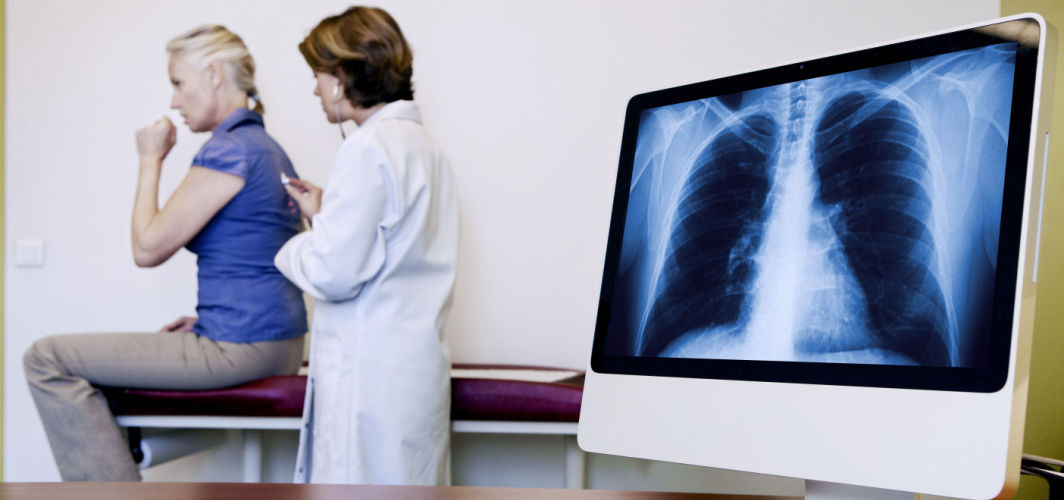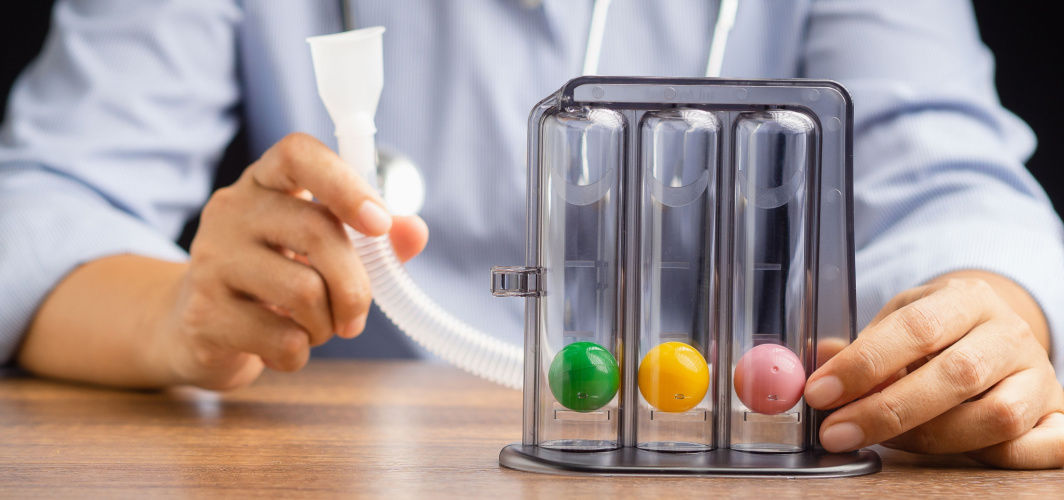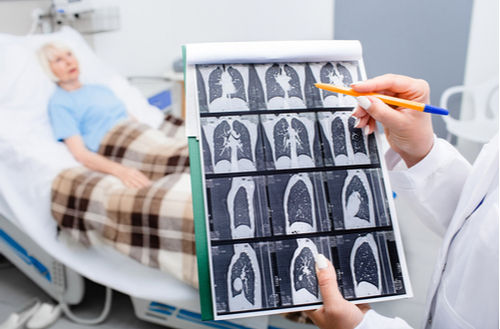Respiratory Health
Pneumonia: Know The Causes And Who All Are At Risk
4 min read
By Apollo 24|7, Published on - 30 January 2023, Updated on - 13 March 2023
Share this article
0
0 like

Pneumonia is a lung infection wherein the air sacs get inflamed and filled with purulent fluid. Pneumonia is a leading cause of death in children under five years, and it is also considered life-threatening for the elderly and people with weak immunity. With symptoms like cough, fever and breathing difficulty, pneumonia can be life-threatening if not treated timely and correctly. Therefore, early diagnosis and treatment are essential to prevent severe complications and death.
What Causes Pneumonia?
The significant causes of pneumonia are bacteria, fungi, and viruses. Bacterial pneumonia is more common compared to its viral and fungal counterparts.
1. Bacterial Pneumonia
Bacterial pneumonia is usually caused by Streptococcus pneumoniae, also known as pneumococcus. This bacteria spreads through contact with infected respiratory secretions like mucus, blood, saliva, and surfaces or objects contaminated with the bacteria.
2. Viral Pneumonia
Viruses are another major cause of pneumonia. These include influenza viruses, adenoviruses, or respiratory syncytial viruses (RSV). These viruses spread through contaminated surfaces or objects and infected person's respiratory secretions.
3. Fungal Pneumonia
Fungal pneumonia is usually caused by histoplasmosis or cryptococcosis. These fungi are found in soil or bird droppings and are spread by contaminated dust. People with weak immune systems are most likely to experience fungal pneumonia.
Who All Are at Risk of Contracting Pneumonia?
You have a higher chance of developing pneumonia if you:
- Are either under the age of two or older than 65 years
- Are coping with lung or heart diseases like pulmonary fibrosis, emphysema, cystic fibrosis, asthma, chronic obstructive pulmonary disease, and sarcoidosis
- Possess a neurological disorder that makes swallowing challenging (dementia, Parkinson's disease, and stroke increase the risk of developing aspiration pneumonia)
- Are in a long-term care institution or a hospital
- Smoke
- Are pregnant
- Possess a compromised immune system and are on immune-suppressing medicines
- Have gone through chemotherapy or an organ transplant
- Have HIV/AIDS
“Red Flags” For Pneumonia
Mentioned below are certain red flags of pneumonia that must be noticed and given the earliest medical attention:
- Worsening chest pain.
- Fainting or dizziness.
- Bluish skin colour (cyanosis).
- Fever with a temperature of 105 degrees F (40.5 degrees C) or higher in children under two years of age.
- Fever with a temperature of 103 degrees F (39.4 degrees C) or higher in adults and children over the age of two.
Pneumonia Treatment Plan
A pneumonia treatment plan includes antibiotics, diagnosis and hospitalisation (if required).
1. Antibiotics
Primary pneumonia treatment includes taking rest and some prescribed antibiotics. In some extreme cases, pneumonia can require hospitalisation. However, in most cases, a doctor can determine which bacteria is causing pneumonia by looking at the symptoms, doing a physical examination, and prescribing antibiotics accordingly.
2. Tests
Sometimes, you may need to take the patient for a chest X-ray or blood test to complete the diagnosis.
3. Hospitalisation
People who are hospitalised may need oxygen therapy and fluids through an IV. In some cases, the patients may require mechanical ventilation.
4. Natural Treatment Without Drugs
Antibiotics are not that effective for viral infections. A doctor may instead suggest rest and drinking plenty of fluids to let our body fight the disease.
Dr S Jayaraman, a pulmonologist associated with Apollo 24|7, says that, “though pneumonia is the 2nd leading cause of death among the top 10 causes of mortality, it is preventable, treatable, and curable. To prevent lung infections from Pneumococci (bacteria) and Influenza (virus), one must get pneumococcal vaccine and flu shot periodically. The mantra for pneumonia prevention is SMSV, which stands for Sanitization, Mask, Social distancing and Vaccination.”
Frequently Asked Questions
1. What is the cause of pneumonia?
Pneumonia is a severe lung infection that can be deadly. Usually, bacteria are the most common cause of pneumonia, but different viruses or fungi can also trigger pneumonia.
2. What are the common symptoms of pneumonia?
The common symptoms of pneumonia are coughing, shortness of breath, rapid breathing, chest pain, sweating, and fever.
3. How is pneumonia diagnosed?
Pneumonia is typically diagnosed based on the symptoms and a physical examination. A doctor may ask for a chest x-ray also to confirm the diagnosis.
4. How is pneumonia treated?
Antibiotics are effective for pneumonia treatment. But in some cases, antiviral or antifungal medications may be necessary. One may also require hospitalisation if their condition worsens.
5. Can pneumonia be prevented?
You can prevent pneumonia by getting vaccinated (pneumococcal vaccine). Moreover, good hygiene practices, such as frequent hand washing, can help prevent pneumonia.
You can recover from mild pneumonia after a few days of rest and isolation. However, you should consult a healthcare professional soon if there is no improvement with the pneumonia home remedies. For an expert opinion,
Respiratory Health
Leave Comment
Recommended for you

Respiratory Health
Difficulty In Breathing? Get This Test Done
Pulmonary function tests (PFTs) determine the functioning of the lungs. PFTs are essential in diagnosing and managing lung conditions.

Respiratory Health
Vitamin C: An Essential Nutrient for Good Lung and Respiratory Health
Research indicates that vitamin C helps in protecting the lungs and also reduces the risk of inflammatory lung diseases while improving overall lung function.

Respiratory Health
World Pneumonia Day: Here Are The Early Signs And Home Remedies
Pneumonia is very common and is the second most common for hospitalisation. Here’s all you need to know about its symptoms, treatment and prevention!
Subscribe
Sign up for our free Health Library Daily Newsletter
Get doctor-approved health tips, news, and more.
Visual Stories

8 Healthy Foods for Asthma
Tap to continue exploring
Recommended for you

Respiratory Health
Difficulty In Breathing? Get This Test Done
Pulmonary function tests (PFTs) determine the functioning of the lungs. PFTs are essential in diagnosing and managing lung conditions.

Respiratory Health
Vitamin C: An Essential Nutrient for Good Lung and Respiratory Health
Research indicates that vitamin C helps in protecting the lungs and also reduces the risk of inflammatory lung diseases while improving overall lung function.

Respiratory Health
World Pneumonia Day: Here Are The Early Signs And Home Remedies
Pneumonia is very common and is the second most common for hospitalisation. Here’s all you need to know about its symptoms, treatment and prevention!